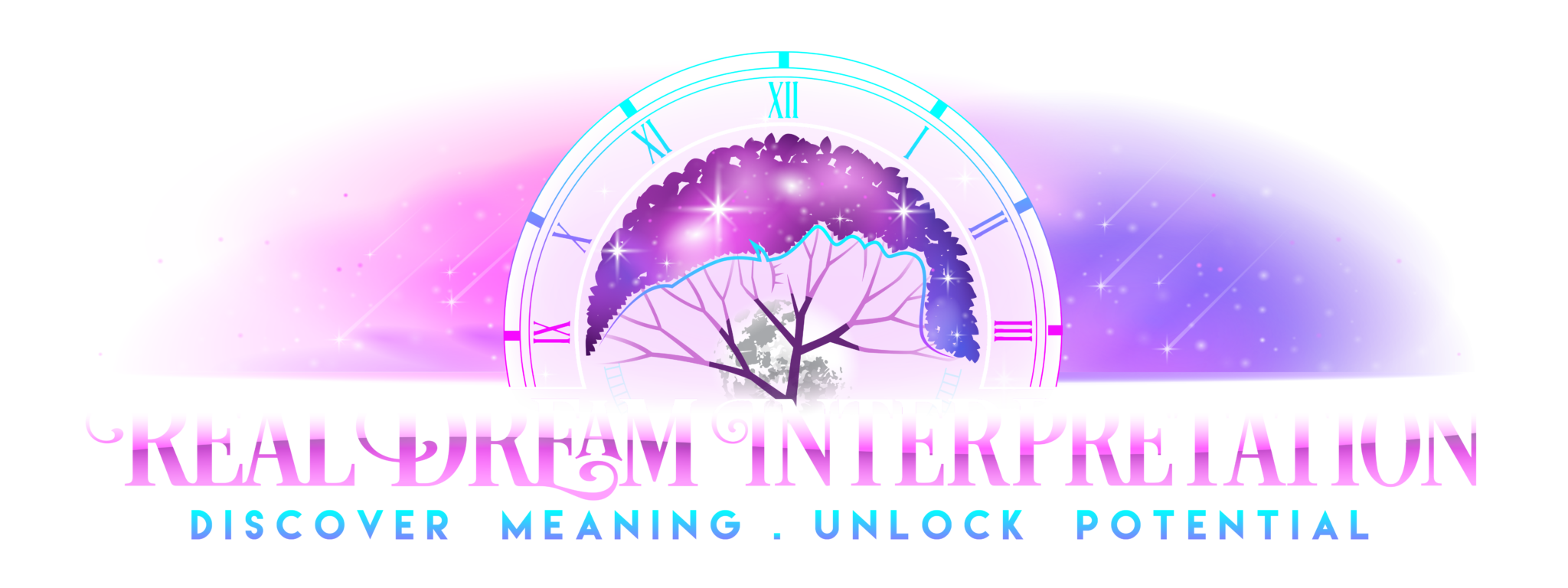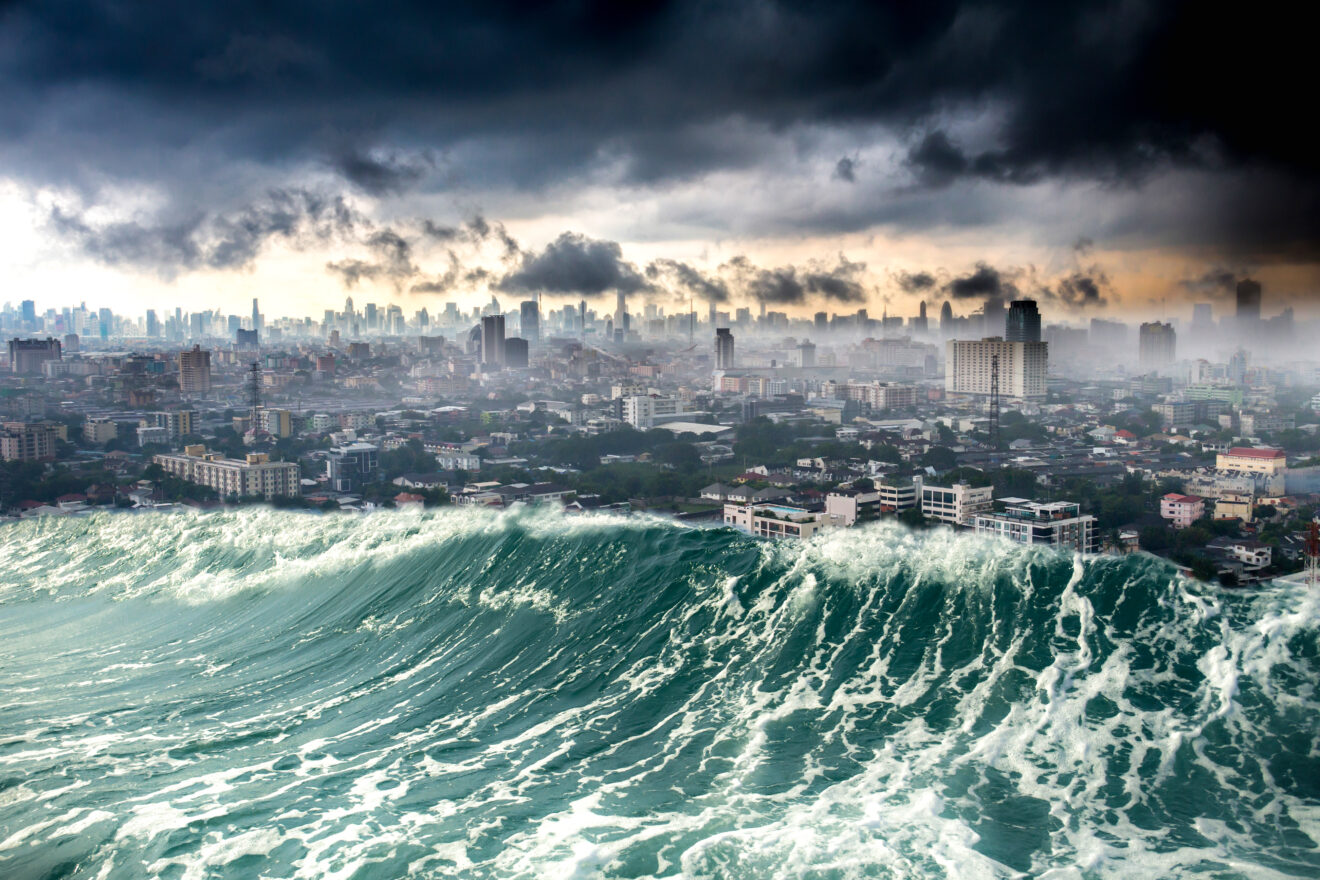Dreams about tsunamis reflect unconscious psychological turmoil and the possibility of being deluged from a flood of unconscious contents. As Jung once said about the vision of a tsunami,
The sea is the symbol of the collective unconscious, because unfathomed depths lie concealed beneath its reflecting surface. Those who stand behind, the shadowy personifications of the unconscious, have burst into the terra firma of consciousness like a flood. Such invasions have something uncanny about them because they are irrational and incomprehensible to the person concerned. They bring about a momentous alteration of the personality …
Table of Contents - Jump to Section
Dreams About Tsunamis
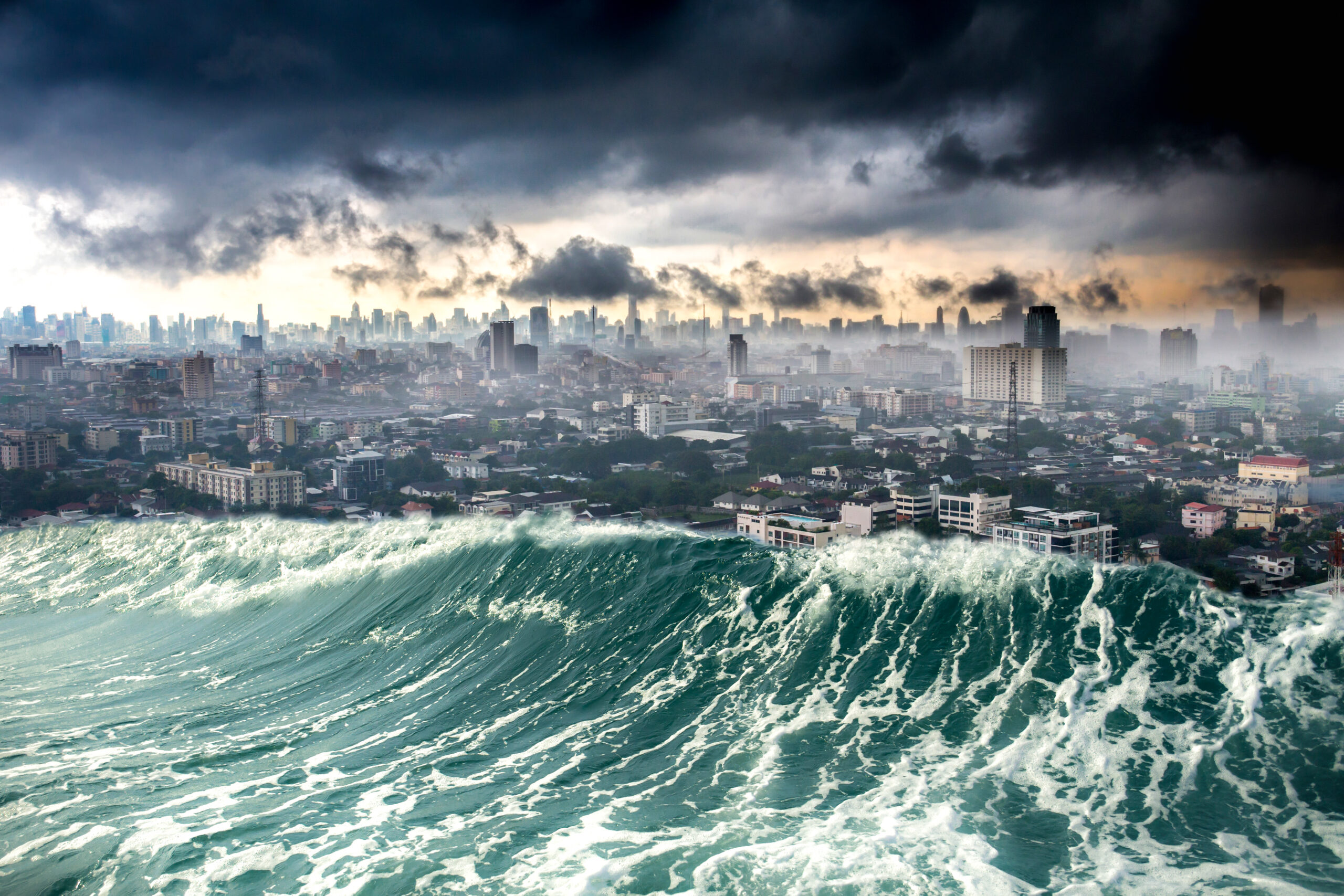 Dreams about tsunamis reflect unconscious psychological turmoil or the possibility of being deluged from a flood of unconscious contents. This image, representing overwhelming affects, signals an intense state where emotions transcend mere feelings. Affects manifest physiologically, physically and behaviorally. It’s as if an emotional undercurrent has surged, prompting reflection on recent heightened sensitivities or reactions.
Dreams about tsunamis reflect unconscious psychological turmoil or the possibility of being deluged from a flood of unconscious contents. This image, representing overwhelming affects, signals an intense state where emotions transcend mere feelings. Affects manifest physiologically, physically and behaviorally. It’s as if an emotional undercurrent has surged, prompting reflection on recent heightened sensitivities or reactions.
The dream tsunami warns of imminent upheaval, a drastic shift bringing uncharted challenges. It’s an unconscious warning of significant transitions ahead, necessitating your awareness and engagement.
This chaotic imagery aligns with flood narratives in mythology, where deluges aren’t mere disasters but transformative events. From Noah’s story to the Epic of Gilgamesh, floods universally precede renewal, eradicating the obsolete for rebirth and new beginnings.
The dream suggests a need for profound internal realignment, urging reassessment of stagnant life aspects and encouraging a fresh start. As with mythological survivors, you’re summoned to authentically reconstruct post-deluge. Ultimately, the dream suggests possible transformation amidst disruption. It’s a prompt that it’s time for introspective renewal and evolution.
Indeed, it’s the rushing water’s immense power and force that add depth and significance to dreams of tsunamis, reflecting the potency of the unconscious. Its forces are immense, often in the form of overwhelming emotions and forces. A tsunami isn’t merely water; it’s an unstoppable force of nature, suggesting a monumental surge from the depths of the Unconscious. Reflecting on this, let’s delve into what this intense symbol might be revealing.
Dreams About Tsunamis: Overwhelming Affects
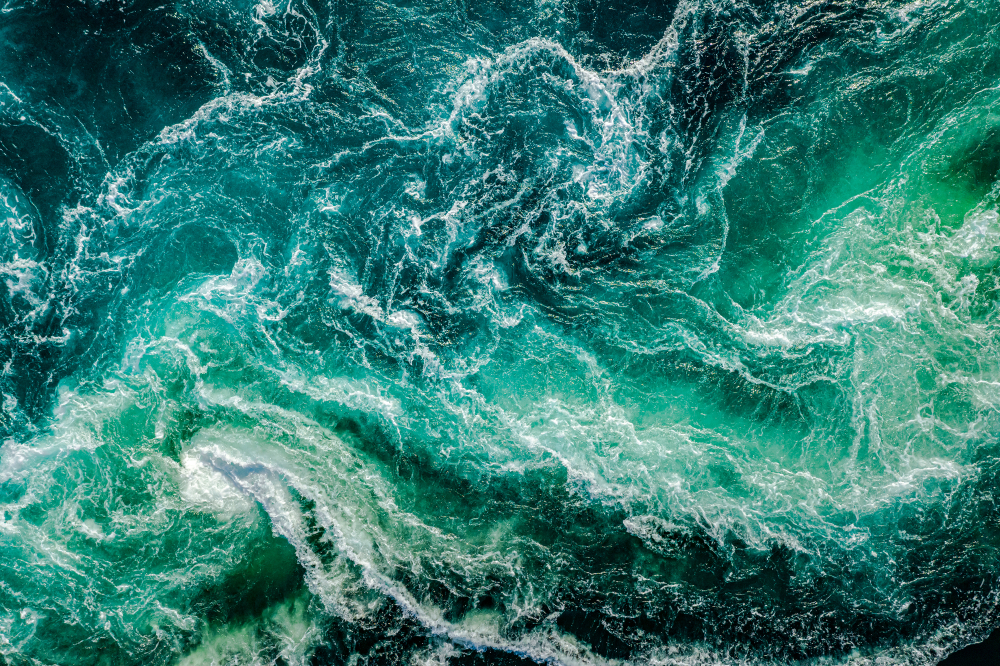 Firstly, the tsunami’s immense power and presence in your dream symbolizes more than just intense emotions; it suggests a state of overwhelming affects. In psychological terms, affect refers to an immediate expression of your emotions and feelings, including your mood and observable behavior.
Firstly, the tsunami’s immense power and presence in your dream symbolizes more than just intense emotions; it suggests a state of overwhelming affects. In psychological terms, affect refers to an immediate expression of your emotions and feelings, including your mood and observable behavior.
Affects are the most direct psychological manifestations of instinct, representing the physiological channels through which instincts express themselves. Psychologically, we perceive affects as pressure, apprehension, fear, or anxiety.
On a physical level, they lead to a rapid increase in arterial pressure, heart rate, and blood flow. This bodily surge transforms the ever-present spark of insecurity into the roaring flames of self-doubt and uncertainty, plunging us into complexity.
An affective response typically indicates that an autonomous complex has been triggered. When a complex is activated—often by a situation or stimulus that resonates with the complex’s theme—it can momentarily dominate your psyche, influencing perceptions, feelings, and behavior. This can often feel like being overtaken by a mood, reactions that seem disproportionate to the current situation, or a flood of unexpected emotions and thoughts.
In the context of a tsunami dream, it could represent the sudden and overwhelming activation of a complex, potentially pointing to an area of inner conflict or past trauma resurfacing, seeking your attention. It’s important to reflect on recent personal encounters or strong reactions—have there been situations where you felt unusually stirred, reactive, or perhaps recognized a pattern in your emotional responses? Such instances might indicate the presence of an active complex, guiding you toward deeper self-awareness and integration of these disowned or suppressed aspects of your personality.
Unanticipated Upheaval in Dreams About Tsunamis
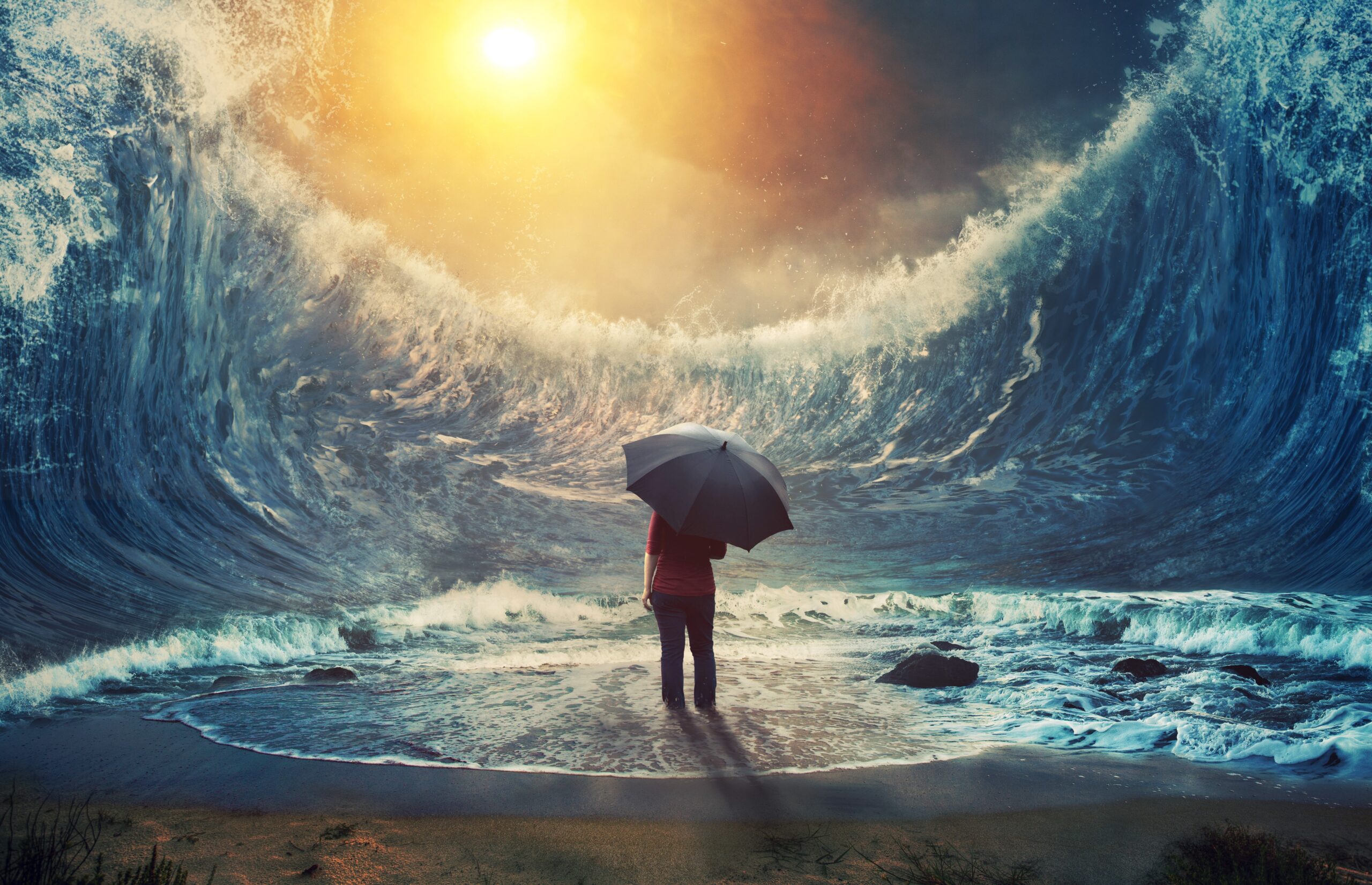 The very nature of a tsunami in a dream underscores the element of surprise coupled with a profound impact. Unlike the predictable ebb and flow of tides, a tsunami symbolizes something far more primal and uncontrollable emerging from the unconscious. This is not merely change. It’s a seismic shift your conscious mind might not be prepared for, often revealing that something significant is amiss or about to unfold.
The very nature of a tsunami in a dream underscores the element of surprise coupled with a profound impact. Unlike the predictable ebb and flow of tides, a tsunami symbolizes something far more primal and uncontrollable emerging from the unconscious. This is not merely change. It’s a seismic shift your conscious mind might not be prepared for, often revealing that something significant is amiss or about to unfold.
Reflect on this:
Are there undercurrents in your life or subtle indications that something is askew, even if you can’t consciously grasp what it might be? Rather than the unconscious already processing a change, it seems to be sounding an alarm, warning that your conscious self is on the brink of a situation or revelation for which it is unprepared. This could be an unresolved issue, a sudden shift in your personal life, or an awakening to a previously unrealized truth that you are not consciously acknowledging.
A tsunami dream vividly illustrates potential psychological unpreparedness for what’s coming, urging attention to the underlying issues. It’s a stark indication to acknowledge and prepare for what your psyche deems imminent and significant.
Catharsis and Transformation in Dreams About Tsunamis
Let’s look at the destructive force of tsunami dreams, through the lens of various cultural myths. The most notable motif is the Great Flood. In these stories, the flood is an act of divine intervention, used to purge the land of its decadence, corruption, or stagnation, and to prepare the ground for a profound renewal.
Noah’s Ark (Judeo-Christian-Islamic Mythology):
Probably the most well-known flood story in the Western world, this tale describes God’s decision to return the Earth to its pre-creation state of watery chaos and then remake it in a reversal of creation. Noah, by divine order, builds an ark to save himself, his family, and two of every animal species from the global flood intended to wipe out humanity because of its wickedness.
The Epic of Gilgamesh (Sumerian Mythology)
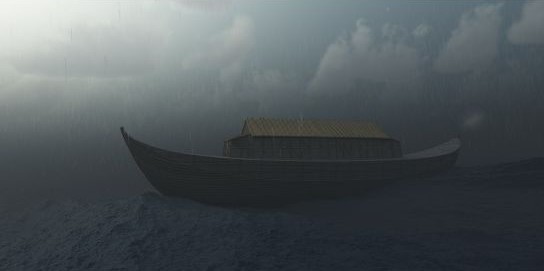
This epic poem from ancient Mesopotamia, often regarded as the earliest surviving great work of literature, includes a flood narrative that predates the biblical story. In it, the gods decide to destroy humanity through flooding, but the god Ea leaks the secret to Utnapishtim, advising him to build a boat to survive. After the deluge, the gods regret their decision, and then grant Utnapishtim and his wife immortality.
Manu in Hindu Mythology
In this version, Manu, the first man, saves mankind from the great deluge that washes over the earth. He builds a boat and survives the flood, accompanied by seven sages and various animals and plants. After the waters recede, Manu performs a sacrifice, from which he produces the first woman, thus regenerating human life.
Deucalion in Greek Mythology
Prometheus, foreseeing Zeus’s intent to destroy humankind, warns his son Deucalion to build an ark. As a result, he and his wife, Pyrrha, are the only survivors of the subsequent flood. After floating in the chest for nine days and nights, they land on a mountaintop and later create new humans by throwing stones behind them, which become people.
These stories and others like them found in different cultures (including Chinese, Mayan, and Aboriginal Australian mythologies) echo similar themes—a divine flood used as a means of purging the earth of human corruption and sin, with a select few preserved to ensure the continuation of life. Each story uses the flood as a symbol of both destruction and transformation, providing a fresh slate for humanity and often a covenant or promise for the future.
The Symbolism of Tidal Waves in Dreams
The surge of water in dreams symbolizes an influx of deep, unconscious emotional content, distinguishing it from our more recognizable, conscious feelings. This distinction is vital in dream interpretation, emphasizing the profound layers of our psyche that we often overlook or misunderstand.
A Personal Encounter with the Unconscious
Consider the story of a woman who dreamt of a colossal wave sweeping over her, causing her wedding ring — a symbol of her marital bond — to slip away as she was tumultuously tossed within the waters. 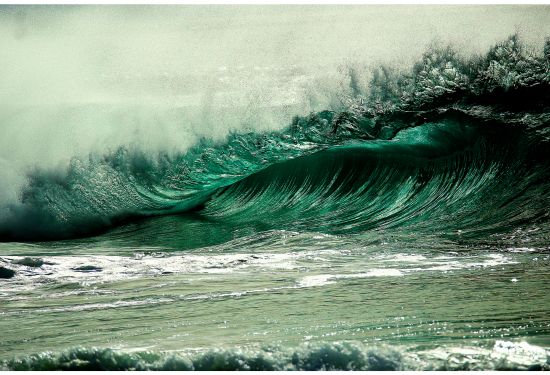 Desperately, she tried to retrieve it, nearly drowning in the process. This woman, despite her conscious mind’s narratives, was submerged in unhappiness, rooted in a troubled marriage. However, she misattributed her discontent to other aspects of her life, such as her career or past, neglecting the clandestine turmoil within.
Desperately, she tried to retrieve it, nearly drowning in the process. This woman, despite her conscious mind’s narratives, was submerged in unhappiness, rooted in a troubled marriage. However, she misattributed her discontent to other aspects of her life, such as her career or past, neglecting the clandestine turmoil within.
Her dream revealed truths unknown, echoing Jung’s wisdom about the unconscious deluge that, though unsettling and irrational, triggers profound personality transformation.
Beyond Surface-Level Interpretations Saying her dream was merely about ‘anxiety’ would be an oversimplification. The tidal wave represented more than fear. It symbolized her unacknowledged feelings, revealing an unrecognized truth about her marital life.
Confronting the Truth Within
As she struggled in water, she symbolizing efforts to salvage her marriage with the wedding ring signifying their relationship. Confronting this interpretation shocked her. The dream revealed hidden conflicts she avoided, sparking a flood of emotions. This led to a significant personal journey shift.
Such is the power of the dream world. They are not random, nor are they shallow representations of our daily worries. Instead, they are profound messages from the deepest recesses of our psyche, urging us to face what we’ve hidden.
The Mythological Flood as Transformation of Consciousness
At its core, Flood myths embody the timeless motif of profound psychic transformation. It is a dismantling of old self and world, followed by rebirth and renewal of understanding.
Eradication of the Old Attitude
In flood myths, divine intervention sends the flood waters to erase corruption, sin, or disorder. Sin in psychological terms simply means unconsciousness. Translated psychologically, this deluge symbolizes the necessary destruction or dissolution of outdated, false, or ego-driven attitudes. These might include ingrained beliefs, societal conditioning, or defense mechanisms that no longer serve our growth. The flood comes to wash away what’s corrupt or decayed, making space for new life.
Chaos and Disorientation
The period during the flood is one of psychological chaos and crisis. This mirrors the turmoil one might experience during transformative periods. Here the usual reference points of self and world dissolve. This might manifest as existential crises, deep questioning, or periods of confusion and depression. It’s a dissolution of known boundaries, creating a formless ‘primordial soup’ from which new consciousness can emerge.
Sanctuary and Preservation of Core Self
The ark or other forms of sanctuary (a mountaintop, a reed boat) represent the indestructible center amidst the dissolution. It’s a center of truth, an inner space of calm during upheaval.
Re-emergence and Rebuilding
After the waters recede, there’s a world to rebuild. In terms of consciousness, this is the stage of reintegration and reconstruction. It’s a time to integrate our transformed understanding and begin to reconstruct our lives around this new center. Certainly, it’s a period of renewal. It’s where the old has been washed away, and the new has yet to form fully. But ultimately, it speaks to the resilience of the human spirit and the natural drive toward growth and actualization.
New Covenant – A Higher Order or Understanding
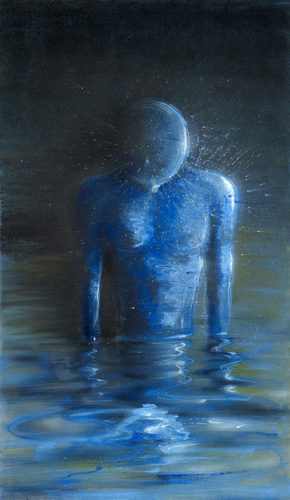 Finally, in many of these myths, there’s a covenant or newfound understanding between humanity and the divine. Psychologically this represents the new paradigm through which we understand ourselves and our place in the larger cosmos.
Finally, in many of these myths, there’s a covenant or newfound understanding between humanity and the divine. Psychologically this represents the new paradigm through which we understand ourselves and our place in the larger cosmos.
In summary, the mythological flood symbolizes the often tumultuous, yet deeply necessary processes of psychic death and rebirth. These processes are integral to human growth and evolution. It’s about courageously facing the dissolution of the known, holding fast to what is essential. Indeed, only then can we emerge from the waters reborn, with a clearer understanding of ourselves and our place in the world.
Ask yourself, what in your life feels like it’s awaiting renewal? Are there aspects within yourself that feel inauthentic, worn out, or deeply in need of a fresh start? The mythological flood teaches us that from the destruction of the old, we can nurture the seeds of new beginnings. Tsunamis in dreams may be a signal from your unconscious that you are ready for this profound internal shift. And finally remember that a rebirth often follows a period of emotional or psychological ‘flooding.’ It’s an opportunity to emerge from the waters psychologically cleansed, ready to rebuild on firmer, more authentic grounds.
- Hidden Meaning in Dreams About Flying: A Jungian Analysis - December 17, 2023
- Dreams About Tsunamis:Title Waves of Transformation - October 30, 2023
- What your dreams are telling you about your life - October 27, 2023
Share this Post
